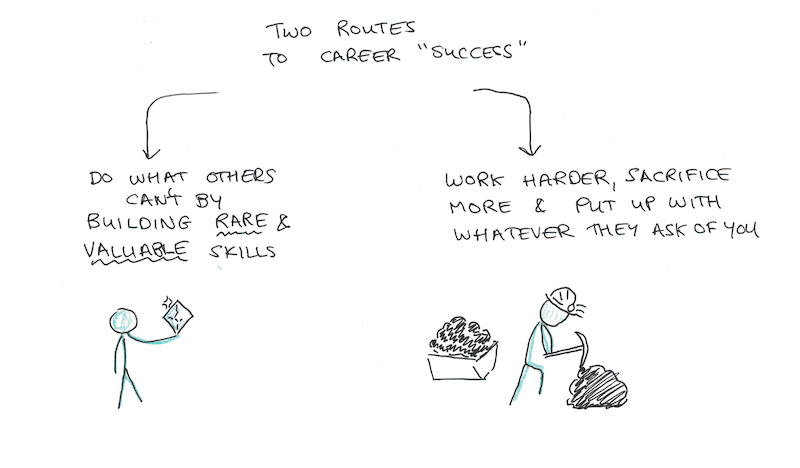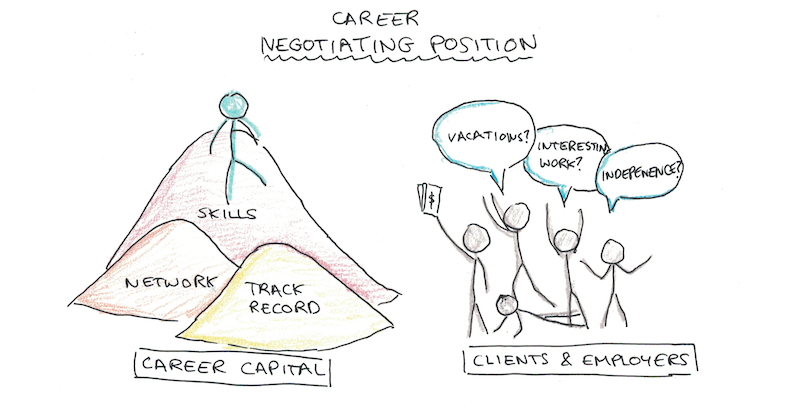In the last two lessons in this series, I first explained why you should master your career, rather than looking for shortcuts or escape paths. Next, I shared how to do that, building rare and valuable skills through deeply understanding your career and getting good at the skills that matter.
Today, I want to talk about a common trap many people fall into with their careers. Instead of viewing success through the lens of mastering the skills of delivering value, they see it about hard work and productivity.
What’s Wrong With Productivity?
On the surface, there’s nothing wrong with working hard or being productive. All else being equal, doing more of these things will improve your career.
Remember the economic logic from the start. Having a great career comes from being able to deliver value others can’t. If you deliver more value, the more career capital you have to negotiate with, not only to earn more money, promotions and prestige, but also to negotiate the kind of lifestyle you want to go with it.
If you do more work, you’ll deliver more value, and if you deliver more value, you’ll have more career capital. So where’s the problem?
The problem is that by hard work alone can often lead to a trap. Think about why your employers or clients want to give you work: because you give them something worth more than the cost.
In theory, there’s two ways you can do this. The first is by increasing the scarcity and value of what you offer. If you can do something that’s more valuable, or that’s harder to find competitors for, you’ll be more in demand.

The second, however, is by simply doing the same work—but doing a lot of it. This is the employee who is valuable, not because they’re doing a higher quality of work that can’t be done elsewhere, but because they deliver a lot more of it. They work themselves sick to meet deadlines, they respond to every email immediately, they never take sick days or vacations, they’re always there to do more of the job assigned to them.
As a stepping stone to learning, or to building other career assets, this kind of behavior isn’t always bad. But many people get stuck in it.
Suppose, after some time pursuing this strategy to your career, you want to transition: work less hours, be more picky about projects, demand more automony and flexibility. What are those same employers and clients going to think?
Now they’d rather not have you. Your main value to them was your willingness to do tons of work, always show up and never be difficult to work with. If you’re not going to do that anymore, you’re no better than any other slacker they have working for them.
Illusions of Career Capital
At the beginning of this series, I argued that career capital reflects your negotiating power in your career. Have a lot of it, and you get to call the shots. You get to decide whether you prefer more pay or more flexible work. You can choose work arrangements that “aren’t allowed” by your company, because you can deliver on things others can’t.
However, this doesn’t often feel like the reality for many of us. We do well in our career, but then the opposite happens! We have more work responsibilities, more demands, fewer choices and freedom than we did when we started out. Why does getting more career capital result in this setback and loss of freedom?
In some cases, this setback is just the result of an unconscious choice. You always prioritized the route that gave more responsibility and demands. As a result, you’re in this situation because you never actually reflected on what kind of lifestyle you really want to lead.
In many other cases, however, this feeling isn’t an illusion. You really do give up a lot of freedom as your career advances. I’d argue this is often because your value statement, the reason your clients and employers have internalized as to why they want you to work for them, is because you do what they want.
True top performers don’t just do whatever other people want them to do. They are often difficult to work with, because their value means they can be extremely picky about what kind of work they do and why they do it.
This doesn’t mean you should go out and start being difficult and picky about the work you do. That’s mixing up cause and effect. But it does show that just focusing on trying to out-work everyone may put you in a situation where you later struggle to negotiate a different kind of lifestyle.
What Can You Do Instead?
Recognize that your career capital, to be truly valuable, should be embodied in things that actually give you the power to negotiate what you want.

If the main reason clients like your work as a contractor is because you do the job really cheaply, you’ll struggle to raise your rates.
If the main reason your boss likes you is because you’ll work 12-hour days to meet a deadline without collecting overtime, you’ll have a hard time asking for a long vacation.
If the main reason your company likes you is because you’ll sacrifice your life for the sake of the job, it will be hard to establish work-life balance later.
Instead, you need to start looking at skills that allow you to be valuable in spite of the things you want from the job.
Deliver a product so high-quality, that your customers will swallow the price tag.
Fix problems at the company nobody else can, that your boss is willing to tolerate that you want to work from home (even though nobody else does).
Productivity and work-ethic are often instrumental in acquiring these skills in the first place. However, it’s a bad idea to mistake them as the source of your real value.
Top Performer, the course I teach with Cal Newport giving you a path to develop rare and valuable skills in your career will have a new session soon. Find out more about it here.

 I'm a Wall Street Journal bestselling author, podcast host, computer programmer and an avid reader. Since 2006, I've published weekly essays on this website to help people like you learn and think better. My work has been featured in The New York Times, BBC, TEDx, Pocket, Business Insider and more. I don't promise I have all the answers, just a place to start.
I'm a Wall Street Journal bestselling author, podcast host, computer programmer and an avid reader. Since 2006, I've published weekly essays on this website to help people like you learn and think better. My work has been featured in The New York Times, BBC, TEDx, Pocket, Business Insider and more. I don't promise I have all the answers, just a place to start.